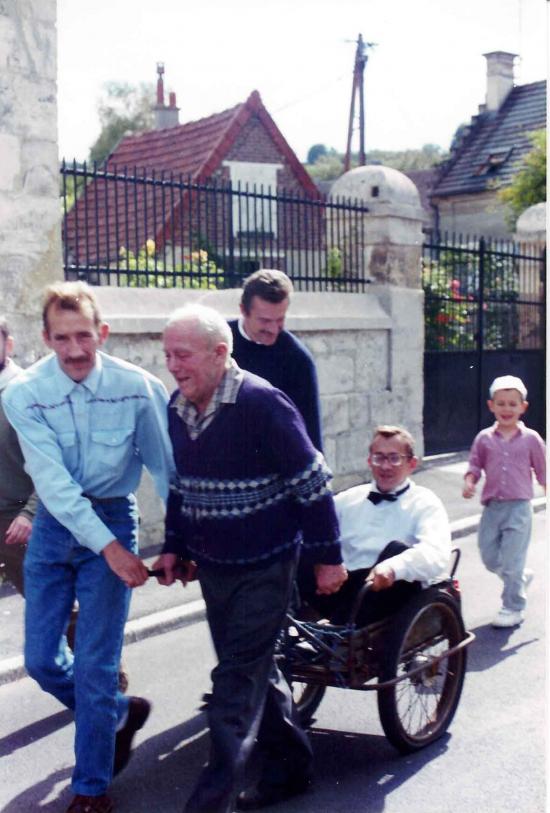 |
|
|
Mr. Potet pulling Dominique in the street of Trosly on his anniversary |
Arthur is a big, white rabbit whose long, black, soft ears cover his cheeks and trail on the ground. He lives in a cage that is much too big for a rabbit of his kind, but its size says a great deal about Arthur’s importance to Dominique, his owner and protector. “If there was no L'Arche, I would not be here and, what would Arthur do if I wasn’t there?” Dominique asks me in a tone both tender and thoughtful.
In the summer of 1998, Dominique was preparing to leave on vacation, but he couldn’t find anyone in his circle of friends and acquaintances to look after Arthur while he was gone. Just like the cicada in the fable, Dominique found himself completely without provision for Arthur. That is when he knocked on the door of Mr. Potet, his neighbour.
Mr. Potet lived on a very small farm in the heart of a small village in the north of France. Like the other villagers, he was not happy when a large house in the middle of the village was sold, then transformed into an institution that welcomed 40 men who were “mentally deficient.” And he did not understand why these strange men were allowed to walk freely through the streets of the village, nor why, a year later, another house, right next to his farm, was purchased, to house more of these men. Unlike other villagers, however, Mr. Potet did not remain silent; he gave free rein to his anger and his violence.
The mayor was forced to intervene, to limit the expansion of the institutions, and a semblance of equilibrium was restored to the streets of the village. After more than 20 years of “co-habitation,” M. Potet’s violence was well-known, and the order had long since been given not to react to the incessant verbal or physical provocations of the seething villager of the rue d’Orleans.
Sometimes, though, something had to be done. Especially when he amused himself by riding his tractor so close to people going about in wheelchairs that one of the tractor’s big tires would brush up against them. He seemed happy to see them tremble in fear. Or the day he entered the Val Fleuri unexpectedly, terrorizing one and all and, before he was done, striking Vanier on the head, partially deafening him.
Over the years, the fear on both sides created an immense and impassible chasm. The little farm was to be avoided. Over time, it became impoverished and dilapidated, until only a few chickens, an old pony, and a lonely farmer remained, apparently without family and without friends.
Had we known what Dominique intended, we would all, no doubt, have discouraged him from knocking on Mr. Potet’s door. But because he hadn’t been able to find anyone to look after Arthur, whom he cared for and protected, Dominique went there without consulting us. Was it the effect of the surprise visit? Was Mr. Potet brought up short by it? Was he touched by Arthur and by talking with Dominique? Or by a farmer’s love of animals? No one knows, but Arthur found himself spending that summer with farmer Potet.
Those of us who lived there could never have imagined this birthday scene, immortalized in the lens of a camera! Dominique, in costume, in a wagon, being pulled by Mr. Potet himself—happy and surrounded by friends—down the rue d’Orleans, right through the middle of the village.
Who can say exactly what happened between these two men? Was it just Dominique’s naivete, or did he see in Mr. Potet something none of us had ever seen or felt? It’s hard to say. But we know that there was a time when Mr. Potet, despite his poverty, would not have accepted our hospitality. The genius of Dominique, whose action broke the circle of violence and aggression, was that he gave this villager, destitute though he was, an opportunity to offer his own hospitality.
Mr. Potet died a number of years later. Several hours before, he called for Dominique to come to his bedside, so that he could say farewell, his “adieux” to the one who had eased and soothed the last years of his life.

 The editor of L'Encyclopédie de L'Agora and well known newspaper chronicler and philosopher, analyses actuality through the looking glass of Belonging.
The editor of L'Encyclopédie de L'Agora and well known newspaper chronicler and philosopher, analyses actuality through the looking glass of Belonging.